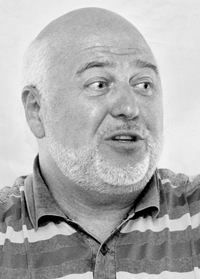Last Saturday, The Day’s unfailing expert Yurii Shapoval, a historian who is well known both in Ukraine and abroad, celebrated his birthday. I called to wish him many happy returns — and couldn’t help using the occasion to ask him about his observations, discoveries, and other novelties in the Ukrainian historical science, as well as recent developments in Ukraine.
I know that you’ve just returned from Stockholm.
Shapoval: “Indeed, there is an international organization known as the International Council for Central and East European Studies that periodically holds what can be described as a world congress of Slavic studies. This year Stockholm hosted the Eighth World Congress (the previous one took place in Tampere and I was among the participants). There were three panels dealing with historical memory. In my panel I delivered the report ‘Memory of the Holodomor in Ukraine in the Early 1930s. New Archival Discoveries and Discussions.’
“A lot of people attended our panel meetings. It was interesting to hear scholars from various countries who deal with problems relating to historical memory, how modern tools were developed to form what we call historical and collective memory. There are no universal tools in the formation of historical memory because it is a process and being involved in or with it is extremely interesting.”
Ukraine is currently in the process of discontinuing the study of topics that are close to you as a scholar — like the Holodomor. Are Ukrainian historians prepared to protect this science against unfair political intrusions?
Shapoval: “Let me stress that the topic of the Holodomor is primarily academic, although some people regrettably tend to forget this. There are political forces that consider themselves versed in these matters, so much so that they pass judgments, return verdicts, make categorical conclusions. This doesn’t cause the scholarly approach to the problem of Holodomor to disappear. People have spent decades studying it in depth. The Day’s readers know that an article by Raphael Lemkin, the father of the UN Genocide Convention, who coined the word, was recently published in 28 languages in Ukraine. The author refers to a man-caused famine as an example of Soviet genocide. A clear-cut definition, so all this fuss about the Holodomor issue, trying to erase it from the list of acts of genocide suffered by mankind in the 20th century, isn’t worth paying attention to. A decent individual shouldn’t shake hands with anyone who denies the fact of the man-made famine.
“Of course, I have a negative attitude to what’s happening in Ukraine these days, but I am not excessively absorbed by this. These people abide by their own stereotypes — there is nothing extraordinary about them, although society should by all means respond to such phenomena.”
Does the international scholarly community acknowledge Ukraine’s progress in reviving its national memory?
Shapoval: “It does. Moreover, European scholars are closely following the process of the formation of Ukrainian historical memory. During the congress in Stockholm, a female Lithuanian researcher presented a comparative analysis of how people remember the Chornobyl tragedy in Ukraine and Belarus. Her French colleague submitted an essay comparing the phenomenon of Khatyn, a village in Belarus whose population was massacred by a Nazi batallion, to that of two Ukrainian villages (among them Kortylisy, the site of the well-known [Nazi] punitive operation. She asked why the Soviet regime placed such emphasis on Khatyn (where a horrible tragedy took place, of course) and not on the Ukrainian villages, where many more people died a violent death.
“All with whom I spoke, particularly my Polish colleagues, bitterly admitted that we had wasted these [past several] years. You will recall that Yushchenko founded the Institute of National Memory in 2006, although it never became an institute as such, rather being a coordinating research center with a vague status. It is most likely yet another bureaucratic institution with a budget of its own which it doesn’t know how to manage. Yet our colleagues in the West really appreciate our discussions on the Holodomor and related topics, that we revise our assessments of the Second World War, that we have progress and dynamics (rather than programmed patterns, as in the Russian historical science).”
All the while wishing you all the best, The Day can’t help asking what you’re working on, about your creative and scholarly plans.
Shapoval: “I’m working on two big projects. The first is entitled ‘Political Encyclopedia.’ My colleagues and I intend to use it above all to modify certain notions and definitions being applied by the contemporary political scientists (including those in Ukraine). There are some 300 authors of texts, among them our colleagues from abroad. I expect to have this project ready for publication by the end of the year. The other project could be described as a sequel to our work in 2009. The Day has written about our publication of the Mykola Khvyliovy case, a collection of documents shedding light on the tragic circumstances of his death. Now we have a declassified dossier dating back to 1940-46, concerning Oleksandr Shumsky, a Ukrainian political figure, a Socialist Revolutionary with a tragic fate. I’m trying to understand his complicated life story, how Shumsky found himself working with the Bolsheviks, what caused the conflict between him and Hrushevsky, and especially later, with Lazar Kaganovich, and so on. Iryna Shatokhina, a film director, and I are working on a documentary about Shumsky, like the one about Khvyliovy. I hope it will appear this fall.”







